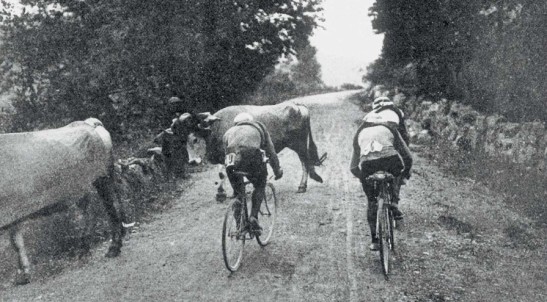Before the peloton moved in a perfectly choreographed blur of carbon fiber and race radios, road cycling was a chaotic, dusty, and frequently hilarious endurance test. It was a sport of epic suffering, yes—but also of missed turns, improvised meals, and the occasional nap in a ditch. This was cycling in its rawest, weirdest, most endearing form.
Fix it or forget it
If your bike broke down mid-race in the early 1900s, your options were limited: fix it yourself or quit. Take Eugène Christophe in 1913—he broke his fork on a mountain descent, walked for miles, and repaired it himself at a blacksmith’s forge. His only help? A boy who pumped the bellows—and got him penalized. Rules were rules, even absurd ones.
Sleep? Find a barn
Not everyone had a team hotel. Independent riders (isolés) often found themselves sleeping in barns, abandoned buildings, or under trees. Sometimes they didn’t find shelter at all. Riders would arrive at checkpoints housed in local cafés, muddy and half-starved, ordering whatever food they could get—then racing off with wine sloshing in their bellies.
Nutrition was… improvised
Forget protein bars. Riders fueled themselves with whatever they could scavenge: sausage, cheese, raw onions, red wine. Abdel-Kader Zaaf once took wine from a fan during a scorching Tour de France stage, got wildly disoriented, and started riding the wrong way. Not a great nutrition plan. Legendary? Absolutely.
Obstacles included parades, goats, and bad signage
No GPS, no marshals—just road signs (sometimes), locals (sometimes helpful), and hope. Riders got lost. They missed turns. One was delayed by a village parade.

Others collided with stray animals. There are tales of chickens stolen, goats dodged, and cyclists sprinting through wedding processions like very sweaty guests.
The weather was an opponent
Snow? Rain? Wind? Suck it up. Riders often stuffed newspapers under their jerseys to stay warm. In one Tour, a storm drove riders into a villager’s cottage, where they sat shivering and apologizing for the muddy footprints. When the storm passed, they returned to the road like nothing had happened.
Sleepy cyclists and roadside naps
Long stages, heavy food, and exhaustion made sleep irresistible.

One rider (possibly Zaaf again) was so tired and wine-logged he lay down under a tree mid-stage. Another fell asleep pedaling and veered off the road. If the race didn’t kill you, drowsiness might.
Victory by accident
Sometimes winning was just a matter of being in the wrong place at the right time. Pierre Beuffeuil famously won a stage after accidentally skipping a stop to greet President de Gaulle. The rest of the peloton waited politely. Beuffeuil, unaware, kept riding—and won.